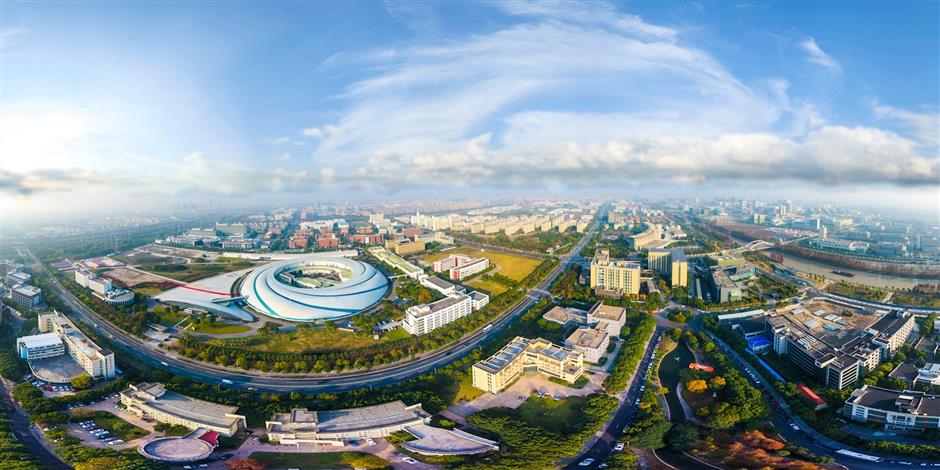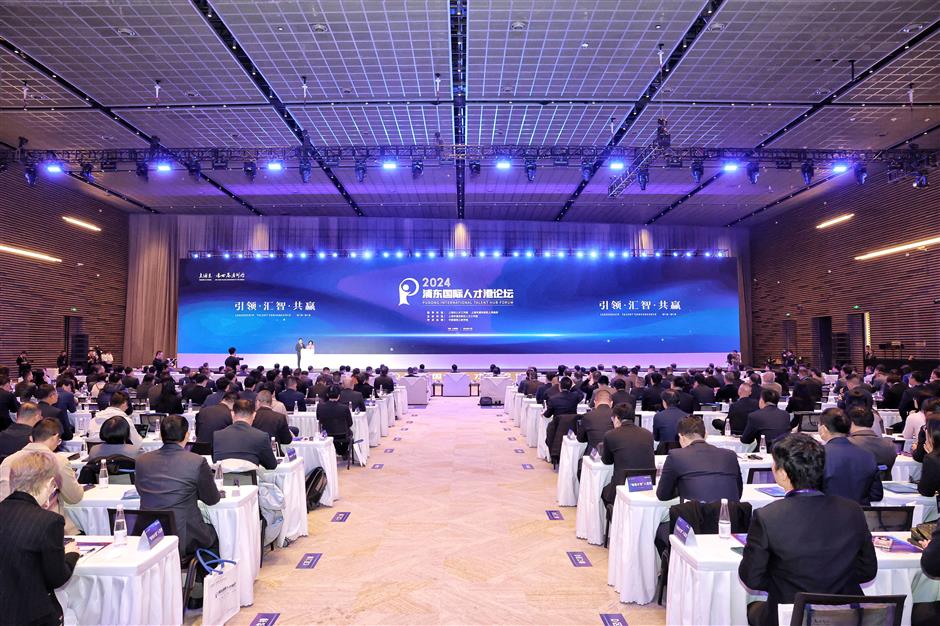Pudong increasingly attractive to foreign talent

Zhangjiang Science City in the Pudong New Area.
Pudong has become a national frontrunner as a district in obtaining the authorization to issue confirmation letters for high-level foreign talent. This enables employers in the area to invite foreign professionals for academic exchanges and business inspections with the convenience of long-term, multiple-entry visas.
This was among the 34 measures announced at an annual talent forum on December 7 to further ease the process for foreign talent to come to Pudong.
Pudong has pioneered the electronic port visa across the entire region. The application process is fully online. On entry, individuals can directly pass through immigration with a passport and electronic visa.
The 2024 Pudong International Talent Port Forum, on December 7, was initiated in 2021 with the aim of promoting the exchange and integration of domestic and international talent and supporting the construction of a high-level talent highland in Shanghai.
In addition to new policies facilitating foreign talent, the forum awarded certificates to representatives of the 2024 "Pearl Plan" and granted permanent residence ID cards to high-level foreign talent.
Similarly, GTP targets experts and professional organizations with broad international perspectives and extensive network resources, aiming to make Pudong the top choice and first destination for both domestic and international talent. Through this program, Pudong has attracted 180 talent partners, and with their recommendations, a significant number of high-level professionals and projects have established themselves in Pudong.
To enhance the convenience of life and work for high-level foreign talent, Pudong has established a direct recommendation system for permanent residence. With the Pudong government's recommendation, these individuals can directly apply for permanent residence in China. On December 7, a group of high-level foreign talent who have contributed to Pudong's economic and social development were presented with permanent residence identity cards.
Samuel Chuffart, global design director of ICONA Design Group and a 14-year resident of Shanghai, is one of the beneficiaries of the "express" residence policy. He said the permanent residence ID card has greatly facilitated his travel to and from China.
"China is the epicenter of my work and life. Although I handle some international projects, I spend most of my time here. The permanent residence ID card gives my life and work a stronger sense of 'belonging,' and I aspire to settle down in Shanghai," he said.
The annual talent forum also featured sub-forums on Pudong's three leading industries: biomedical, integrated circuits and artificial intelligence, fostering in-depth exchange and cooperation among talent in these fields through industry promotion, theme speeches, trend reports and roundtable discussions.
Throughout the month, Pudong will host a variety of talent activities, including the "Pearl Cup" entrepreneurship competition, entrepreneur symposiums and special salons on talent policy service packages, all designed to continuously create a strong atmosphere for attracting and retaining talents in the new area.

Sidebar on sub-forums:
1. Biomedical
After three decades of growth, Pudong's biomedical sector has achieved a series of innovative outcomes, with talent recognized as the wellspring of this innovation. Data reveals a significant influx of top-tier professionals. The industry's workforce in Pudong totals 129,100, representing 45.9 percent of Shanghai's overall total, with 42.3 percent of these being under 35. The share of employees holding a bachelor's degree or higher is 60.6 percent, reflecting a steady influx of highly educated talent. The presence of doctoral-level professionals stands at 4 percent, leading among the three key industries. Additionally, there has been a 2.5 percent year-on-year growth in the proportion of master's and doctoral-level talent.
2. Integrated circuits
The Shanghai Integrated Circuit Design Industrial Park, managed by Zhangjiang Hi-Tech, is among the inaugural batch of municipal-level industrial parks in Shanghai. It has attracted seven of the world's top chip design firms to establish their regional headquarters and R&D centers within its boundaries, and six of the nation's leading chip design companies have also based their headquarters and R&D centers here. Zhangjiang Hi-Tech officials have expressed their commitment to capitalize on their inherent strengths as an industrial resource coordinator, with the goal of developing a "reservoir" and "strong magnetic field" for IC industry talent. This strategy aims to cultivate a globally renowned, high-end IC industry cluster.
3. Artificial intelligence
Pudong, being one of the pioneering regions in China to develop the AR industry, has established itself as a national pilot zone for AI innovation and application. As of the end of 2023, Pudong is home to over 600 key AI enterprises, with the AI-related industry scale surpassing 140 billion yuan (US$19.24 billion).
During the forum, a trend report for Pudong's AI industry was unveiled. The AI industry in Pudong constitutes 40 percent of Shanghai's total, and the district also leads the city in terms of total talent pool. The industry is facing an overall talent shortage, with a pronounced demand for highly educated professionals possessing relevant work experience. Additionally, there is a significant demand for multidisciplinary talent, indicating a preference for individuals with a diverse skill set.
In the specially designated AI enterprise booth interaction area at the forum, eight companies, including Molecular Mind, Data Grand and TTC, made their appearances, showcasing a comprehensive view of AI enterprise talent team construction and the latest AI products.
















